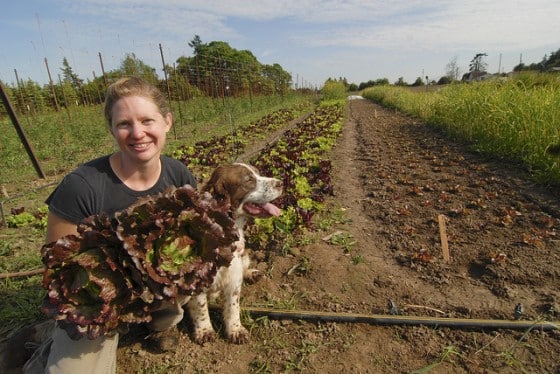
Sustainable Food: Fruits and Vegetables the Fresh, Local and Organic Way
Sustainable agriculture has often been described as a way to grow food in a manner that does not have an adverse effect on the environment, that is healthy for the consumer, the animals and the land on which it is grown/raised, that takes into consideration the health and welfare of the workers, and which supports and gives back to the local community. Sustainable agriculture is not only about conserving, but preserving as well. As a rule of thumb, sustainable agriculture believes what gets taken out of the environment should be put back into the environment. You can find out more about the growth of global organic agricultural and sustainable food practices in this report from the WorldWatch Institute.
Now, in the name of food sustainability, here are some tips and tricks to help you acquire your own fresh fruits and vegetables:
- One of the best ways to ensure your fruit and vegetables are organic, pesticide-free is to grow them yourself. Growing your own food is not only more sustainable, but saves you money too. Here is how you can save money by growing your own fruits and vegetables.
- Speaking of pesticide-free…another important reason to grow your own organic fruits and vegetables is that an active ingredient in Monsanto’s Roundup Herbicide has been linked to cancer, autism, Parkinson’s and Alzheimer’s.
- Before you start digging up your yard in order to plant a vegetable garden, however, you might want to read up on some of the personal and environmental benefits of container gardening.
- For those of you who live in apartments or houses that have very small yards, with no real space to put a full garden, here are some tips for growing food in a small space.
- If you are not really the gardening type and would rather not have to deal with all the dirt and mess that traditionally goes along with gardening, you might want to check out some of the benefits to having a hydroponic, organic garden. As a matter of fact, plants grown through organic hydroponics are 150% more nutritious than organic vegetables grown in dirt.
- You can even take your hydroponic garden one step further, by taking advantage of all that technology has to offer, with one of these 12 plug-and-play home hydroponic systems.
- Another option is to subscribe to, or join, a local CSA (community supported agriculture) like Farm Fresh to You. With this type or program you will be able to get fresh fruits, vegetables and herbs delivered straight from the farm to your doorstep, without even having to do any of the gardening yourself.
- Of course, if you do not want to grow your own food, and do not want it delivered to your door, there is always the option of going to a local farm and picking it yourself. Check out pickyourown.org for a listing of the PYO farms near you.
- Since local farmers do a lot, not only for you, but for the community at large, here is a list of ways you can support and give thanks to your local farmers.
- Keep in mind that starting your own garden, and growing your own food, will help encourage healthy eating. This goes for school gardens as well. In fact, a recent study suggests that schools who establish gardens, and involve their students in a school gardening program, help promote healthy eating and cultivate an interest in trying new foods.
Turning to fresh, local and organic fruits/vegetables will help bring about improved health and overall well-being. By doing the above actions, along with lessening our food waste, and using composting as a smart way to give back to the environment (and invest in our future food supply), we will truly be on the road towards greater food sustainability.
Image by USDAgov via Flickr Creative Commons
4 Comments
-
Deanne
Hi! Do you use Twitter? I’d like to follow you if that would be ok.
I’m definitely enjoying your blog and look forward to new posts.
-




Adam
Aquaponics is the science of raising fish and growing vegetation within a closed water system that takes advantage of the natural partnership that exists between aquatic animals and plants. Aquaponics is considered a combination of two older approaches to cultivating fish and plants; aquaculture (fish farming) and hydroponics (the growing of plants in nutrient rich water without soil.) By combining these approaches, many aquaponics fans around the world have experienced tremendous success in developing sustainable platforms that turn out organic produce and fish that can either be consumed or kept as ornamental accessories or wet pets.